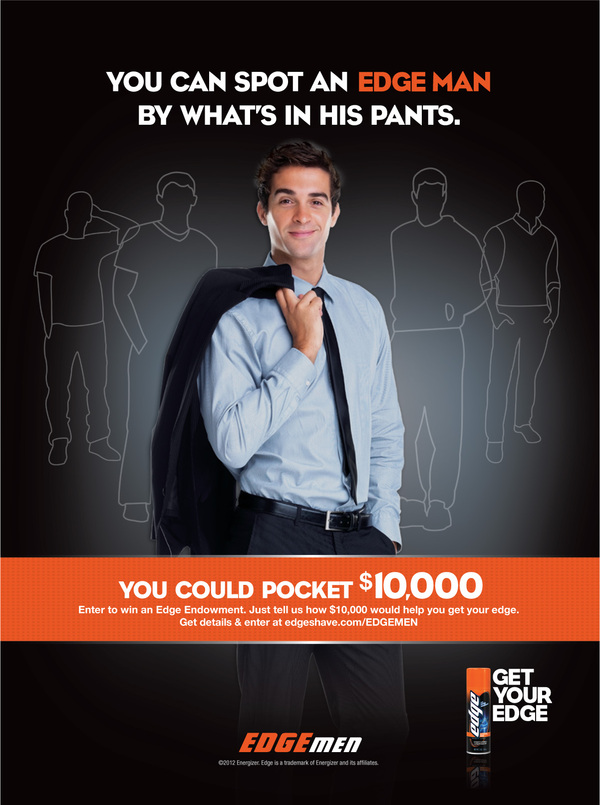
Size may not really matter to women, but that hasn't stopped advertisers from telling men that they might not "measure up." According to the creative team behind Edge shaving gel, being a real man is for once not about getting a close shave (no mention of that) but about having more ... in your pants.


With copy like "Edge Men are better endowed" and "You can spot an Edge Man by what's in his pants," the company barely tries to be clever -- though the "endowment" they are referring to is a financial one, giving men the chance to win $1,000 or $10,000 in a sweepstakes. The underlying messages are clear: having more money and a bigger penis makes you a better man. The ads, like most that use sex to sell usually unrelated products (I mean these are about shaving gel ...), are tongue-in-cheek and ridiculous. But making this highly sexualized marketing laughable is part of the ploy. The more absurd ads like these seem, the less we pay attention to the damage they do, the way they reinforce the idea that your value as a person does in fact depend on what's in your pants.
As Jean Kilbourne, Ed.D., acclaimed filmmaker and author who specializes on the topic of gender and advertising says in her film "Killing Us Softly 4":
Ads sell more than products. They sell values, they sell images, they sell concepts of love and sexuality, of success and perhaps most important, of normalcy. To a great extent, they tell us who we are and who we should be.
This is hardly a new topic -- especially when we're talking about women. Filmmaker Jesse Rosten's recent parody of "beauty industry secret" Fotoshop for Adobe, says it all. "Maybe she's born with it," says the video. "Uh, nah, I'm pretty sure it's Photoshop." We're finally as a culture paying more attention to male body dysmorphia and eating disorders -- Morgan Spurlock's new documentary "Mansome" promises to tackle some of these issues -- but ads that suggest a man's worth lies in his physical appearance exacerbate those problems. Who can forget the ab-focused David Beckham H&M Super Bowl commercial, which was basically just one long "look you up and down" shot? Or last month's ad for air freshener that used a photo of a shirtless model with copy that read, "Look at this gorgeous air freshener next to this gorgeous man." Subtlety never was an advertiser's strong suit ...
As beautiful as David Beckham and his chiseled abs are, advertisements like these are just as bad for dudes as Go Daddy commercials are for women. A 2004 study concluded that "exposure to media images of the ideal male body" -- predominantly toned, muscled models -- had a significant negative impact on the way that men felt about themselves and their bodies. Equality is usually something to celebrate, but equal opportunity objectification is one type of parity we never needed to reach.
RELATED SLIDESHOW: Axe Shower Gel Ads Tell Men To "Keep Up"

